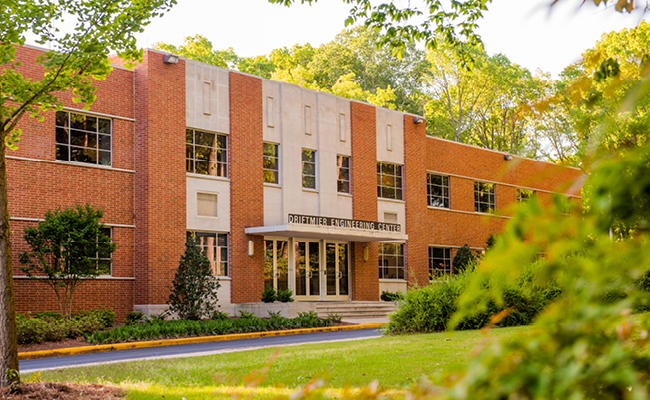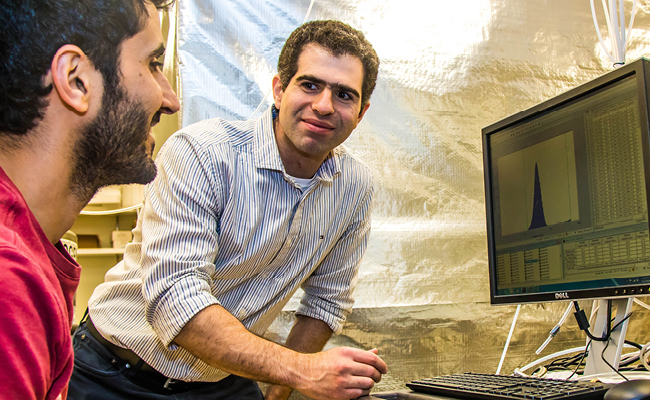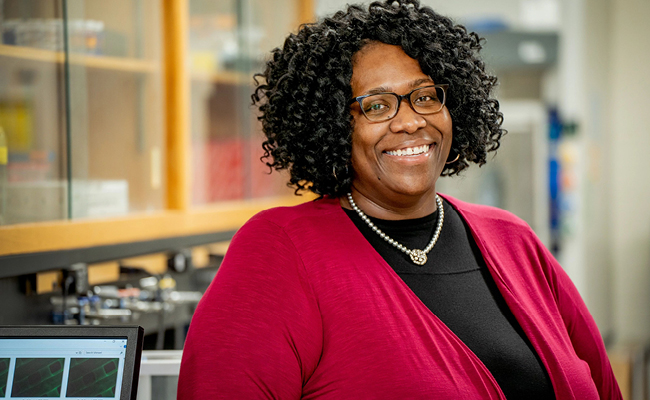 Cheryl Gomillion and Rawad Saleh, two assistant professors in the University of Georgia College of Engineering, have received grants from the National Science Foundation Faculty Early Career Development Program (CAREER) to advance their research and build opportunities for students.
Cheryl Gomillion and Rawad Saleh, two assistant professors in the University of Georgia College of Engineering, have received grants from the National Science Foundation Faculty Early Career Development Program (CAREER) to advance their research and build opportunities for students.
CAREER Awards, among the most prestigious and competitive grants awarded by the NSF, support early-career faculty who shine as both researchers and professors and who can make a major mark with their work — both at their home institutions and across their fields.
“Both Cheryl and Rawad are committed to solving some of the most pressing challenges facing society and this recognition of their research by the National Science Foundation is well-deserved,” said Donald Leo, dean of the College of Engineering. “In addition to answering big questions in their respective fields, they’re working to empower a new generation of engineers to carry on this important work.”
Saleh, who runs the Air Quality and Climate Research Laboratory at UGA, will advance the understanding of the impacts of particulate wildland-fire emissions. With a special focus on brown carbon, Saleh and an interdisciplinary team will develop an optical distributions framework to calculate the light-absorption properties of brown carbon and its role in earth’s climate system.

Rawad Saleh’s research focuses on the impacts of particulate wildland-fire emissions, particularly brown carbon.
“Wildland fires promote ecosystem health and resilience. On the other hand, smoke emissions are associated with impacts on public health and the climate,” Saleh said. “It is important to understand the interplay between the benefits and costs to guide planning for management and mitigation of wildland fires.”
One of the drawbacks of studying smoke emissions in a laboratory, however, is that the conditions aren’t representative of real fires. The Forest Service Center for Forest Disturbance Science has built a one-of-kind combustion facility on the UGA campus, which will allow researchers to simulate wildland fires in a lab setting. Saleh will work with Joe O’Brien, a fire ecologist at the center, who has extensive experience in managing wildland fires and will provide guidance on conducting the burns in a realistic fashion.
Funded by a nearly $700,000 award over the next five years, the research team will first conduct experiments to study critical aspects of how the smoke evolves in the atmosphere and interacts with sunlight, which isn’t currently well-understood. In the second phase, the team will incorporate the new data in a large-scale computer model to better predict the impacts of wildland fire smoke on the climate.
The project has a strong collaborative nature, pulling in a diverse set of skills — with experts in fire science, ecology and smoke characterization — and several research groups from UGA and other universities to participate in the experiments to study multiple aspects of the smoke. Undergraduate researchers and high school interns will be able to participate as well.
“The research will demonstrate how a diverse set of STEM skills is used to address a global challenge, which we hope to inspire the high school interns to pursue degrees in STEM fields and the undergraduate researchers to pursue graduate degrees,” Saleh said.
As part of her CAREER Award, Gomillion, who runs the Tissue Regeneration (RegenX) Laboratory at UGA, will develop strategies and tools to better understand the role of the tumor microenvironment in cancer metastasis. Detection of metastatic breast cancer typically doesn’t occur until after the cancer has moved to other areas, including to the bones, lungs and brain, which often results in delayed treatment and more advanced cancer cases.
“Most cancer-related deaths result due to metastasis, or the spread of cancer to other parts of the body,” Gomillion said. “If we can potentially identify early signatures or indicators of cancers that may be metastatic, that could result in better patient outcomes and save lives.”

Cheryl Gomillion will use her NSF CAREER grant to develop tools and strategies to better understand the role of the tumor microenvironment in cancer metastasis.
The research team will measure the quantitative properties of cancer cells to better understand what contributes to metastatic cancer and what specific signatures those cells have that distinguish them from non-metastatic cells, with a particular focus on the role of the extracellular matrix and secreted factors from adipocytes (fat cells).
Gomillion’s team will test the hypothesis that breast cancer cells have inherent phenotypical characteristics associated with impedance, cell shape and gene expression. In vitro models will allow for continuous, real-time measurement of cell behavior. Based on the findings, the data can be used for translational approaches in the future to model and predict the likelihood of metastasis in clinical samples.
Funded by a more than $567,000 award over the next five years, the project will incorporate a multidisciplinary approach that involves tissue engineering principles, electrical cell impedance measurements, image analysis, and cell biology to understand the metastatic behavior of cancer cells. The project will also increase the participation of underrepresented students in biomedical engineering through work with the UGA Young Dawgs and Peach State Louis Stokes Alliance for Minority Participation, including K-12 initiatives and community-focused outreach. Gomillion is looking forward to the collaborative approach with experts in several fields.
“Cancer is a complex disease,” Gomillion said. “In alignment with its complexity, it will take input from researchers in multiple areas to not only understand what’s happening biologically at the cellular level, but to also create and apply engineering tools and approaches that can be useful for studying these problems.”


